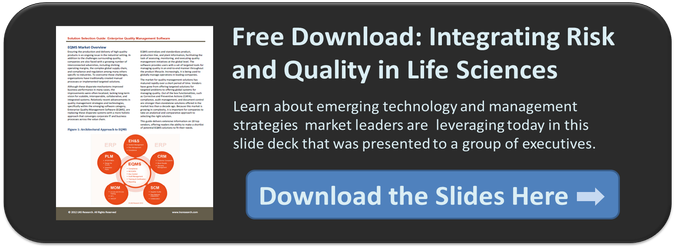The issue of ensuring quality in manufacturing is timeless. What changes are the complexities of these issues and how decision-makers respond to them. At LNS Research, we advocate for companies to develop an Operational Excellence definition that aligns financial and operational objectives with the right mix of people, processes, and technologies. These resources are essentially a tool belt for battling and foreseeing the adversities that emerge in our everyday operations.
 Within this Operational Excellence framework, it’s important to note that the capabilities of people, processes, and technologies should be viewed as dynamic. People today, for instance, bring a wealth of intellectual capital, such as Six Sigma certifications, that help them better understand and use operational metrics. Similarly, the automation of processes has much stronger drill down functionalities and emerging technologies are connecting data at an enterprise level.
Within this Operational Excellence framework, it’s important to note that the capabilities of people, processes, and technologies should be viewed as dynamic. People today, for instance, bring a wealth of intellectual capital, such as Six Sigma certifications, that help them better understand and use operational metrics. Similarly, the automation of processes has much stronger drill down functionalities and emerging technologies are connecting data at an enterprise level.
Quality Management Strategy and Operational Excellence
With the nature of rapid change in these resources, it’s understandable that executives may not be entirely up-to-date or utilizing the latest industry trends. In this blog, we highlight 5 of the biggest mistakes decision-makers are making in quality management strategies that may be keeping their company from reaching Operational Excellence.

1. Underutilized Operational and Quality Metrics
Executives and plant managers constantly reference metrics in meetings and discussions, but not all of them are leveraging their full potential. Unfortunately, many companies are underutilizing the power of these metrics, falling behind relative to competitors without knowing because they don't have the ability to benchmark. By integrating a system for measuring progress into your Operational Excellence model, you can benchmark and prioritize areas that are most affecting your business performance. Some notable metrics include Cost of Quality (Cost of Good Quality + Cost of Poor Quality), Overall Equipment Effectiveness, and New Products Introduction. Our previous blogs provide more information on quality and operational metrics.
2. Disconnected Quality Management Systems
There are many enterprise applications available today as well as solutions that tailor more toward specific functionalities. Although companies implement software to increase visibility, by choosing disparate applications for each part of the value chain, organizational communication can become more difficult. Further complicating things, M&A activities can come with compatibility issues, which are not always resolved immediately. Enterprise-wide standardization and technology interoperability should be a main focus in creating strategic objectives. Enterprise Quality Management Software (EQMS) is beneficial here.
3. Siloed Manufacturing Data
Executives and plant managers ideally want a system in place which provides data granularity that can be monitored in one central location. Internally (products, production lines, and plants) and externally (up and downstream activities), more visibility allows for cross-functional conversations and decision-making. Many orgnizations lack the ability to have informed discussions on how various parts of the value chain interact with one another and can be improved. Again, enterpise applications such as EQMS and ERP can provide more clarity for manufacturers.
4. Inconsistent Leadership Support
Whether it’s regarding safety, sustainability, quality, or other areas, any initiative needs support from the top down. We’ve seen companies, for instance, attempt to enhance quality capabilities with an EQMS and fail because support for the enterprise level implementation did not span across the enterprise. For a quality initiative, executive buy-in is imperative for its success. It needs to be catalyzed from the top by a change in culture, rewards and incentive programs, internal marketing campaigns, and employee education programs.
5. Reactive instead of Proactivity
Leading manufacturers tend to stay ahead because decision-makers aren’t just using their resources to perform well, they’re using them as a proactive tool that looks into the future. Companies that we’ve seen fall behind are often not up-to-date on changing industry trends and regulations and aren’t properly leveraging maintenance technologies for equipment. To rectify these issues, executives and plant managers can join industry associations to stay ahead of the news and changes. Also, they can implement preventative maintenance capabilities, measuring their progress with metrics such as the OEE formula.
By not taking advantage of the growing capabilities of people, processes, and technologies, manufacturers are at risk of falling behind. Metrics, quality management systems, manufacturing data, leadership, and proacitivity should all have a stake in your Operational Excellence framework. As mentioned, EQMS can facilitate and even enhance many of these areas. Our recent Research Spotlight, Enterprise Quality Management Software Best Practices Guide, touches on how decision-makers can build EQMS and quality into their Operational Excellence framework.
